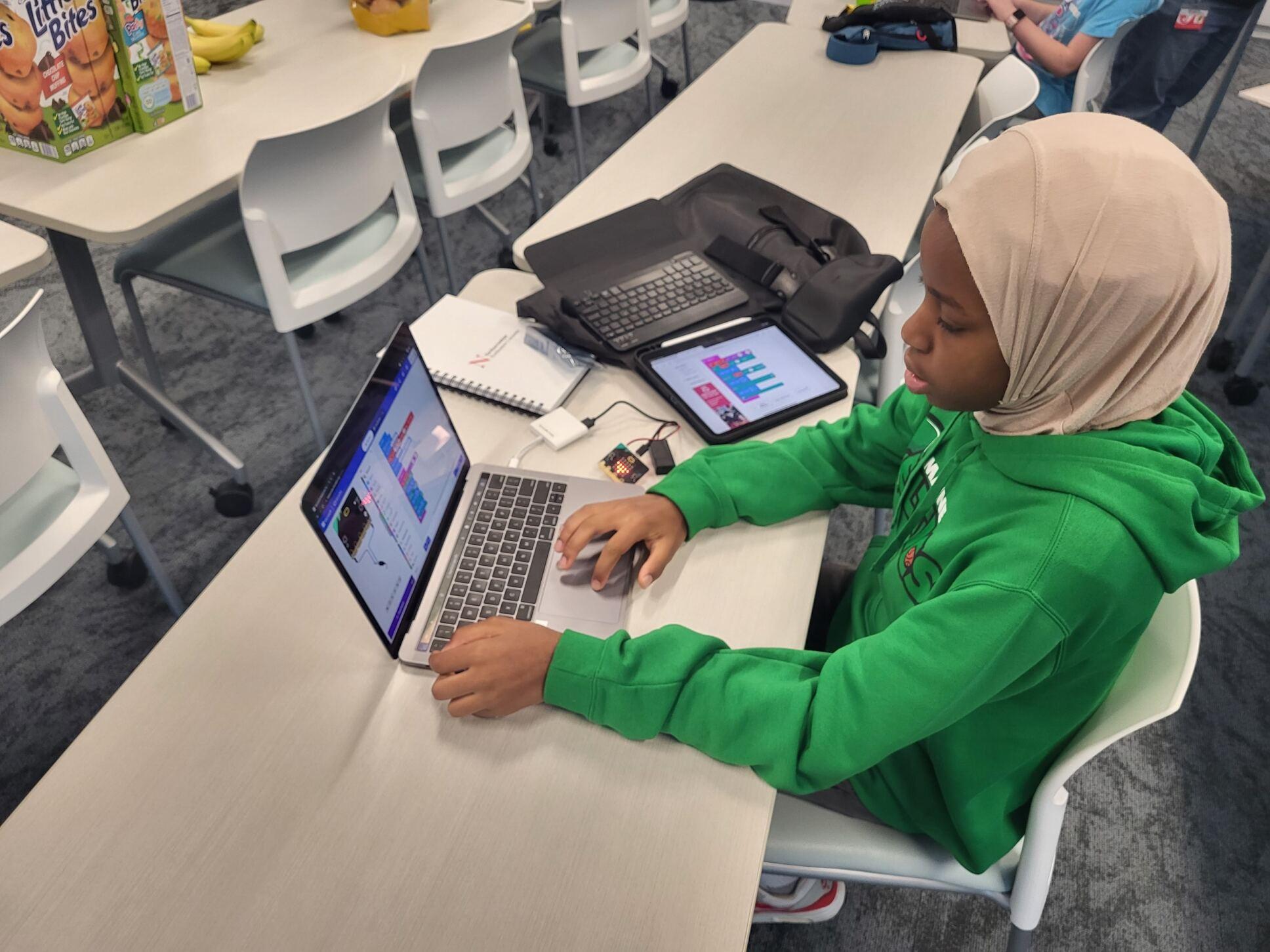Young Students Program Robots and Computer Games at This Year’s Girls Who Code Summer Camp
On a recent afternoon at the Roux Institute campus in Portland, ME, three adults tried in vain to beat a computer game created by a 13-year-old named Mayu. The objective was simple: You have three tries to correctly guess a number between 1-10. If you guessed incorrectly, the game prompted you to try again. Despite the best efforts put forth by each player, Mayu’s game outsmarted all. The number to guess was 10.
Mayu, a student from Windham, created the game as way to experiment with the programming language Python during her time at the Girls Who Code summer camp held at Northeastern University’s the Roux Institute this August. The week-long camp, which welcomes middle and high school students, introduces participants to the basics of coding and the world of tech in general. Students received instruction in programming, participated in team building exercises, and heard from daily guest speakers who spoke about their experiences as women working in tech.

Amelia, a student from Portland, said one of her favorite moments of the program was when the group went next door to WEX to hear from their Women in Tech team. She said it gave her some ideas of what type of career she might pursue someday.
Kayleigh, another student from Portland, was also inspired by the guest speakers who spoke about their jobs in computer science. “I’d really like to work in software someday,” she said. “Or maybe biomedical engineering.” Both Amelia and Kayleigh started learning code through programs at their school, but camps like this help broaden their skillsets and keep them engaged in the practice.
On the final day of the camp, students presented their final projects, which included programmable robotic Lego vehicles and micro:bits – small, pocket-sized computers that students can program to create simple games. The students programmed their projects using block-based coding, an introductory coding language that allows users to pull code in and alter it rather than writing it from scratch. The language serves as a gateway to more complex programming languages, which several students said they were eager to learn.
“I’m just a beginner,” Aamira, a student from Portland, stressed. “But I want to keep learning. I’ve always wanted to make my own video game, and I thought this camp might help me start. I want to learn JavaScript next.”
Aamira showed off a robotic transportation vehicle she had built during the camp. She programmed the vehicle to run for ten seconds, stop, open and close its door, and then resume running.
Other participants were also interested in the prospect of someday creating their own video game, like 12-year-old Sydney, also from Portland, who had programmed her micro:bit device to play a best-of-three game of Rock, Paper, Scissors with whoever was using it.
“I’m good at coding. I like coding,” said Sydney. She first began experimenting with coding on Scratch, an online coding community for kids. She’s already started working on building her own video game.

Amelia from Scarborough merged her love of Pokémon with her interest in coding by programming her micro:bit to randomly generate a Pokémon character, then ask the user to perform different functions in order to “catch” the Pokémon. Amelia also built a robotic Lego car, which she enjoyed iterating on until its wheel-speed was to her liking. She sees a future where robotic vehicles can help business owners.
“Something like this could help small businesses deliver to nearby places,” Amelia said.
Lindsay Jamieson, the lead facilitator of the camp and a teaching professor of computer science at the Roux Institute, stressed how important it is to make coding accessible to everyone.
“By normalizing coding for female and nonbinary students, we have a better chance of them identifying coding as something they want to do in high school and college. When we expand the base of people who code, we gain access to ideas and thought processes that aren’t available when coding teams are homogenous.”

Angela Oechslie is the program director of Project>Login, the signature program from Educate Maine that acts as Maine’s community partner for the nationally based Girls Who Code Program. Project>Login partners with schools and organizations around the state to set up Girls Who Code clubs and camps; the camp at the Roux Institute was one of seven held in Maine this summer.
Oechslie says she has already seen tremendous impact from the program in the past few years. “Maine went from having just four moderately active [Girls Who Code] clubs to over 25 active clubs with 43 trained facilitators,” she said, and she doesn’t see things slowing down anytime soon.
Oechslie hopes to launch 15 new Girls Who Code clubs around Maine this fall and winter. These clubs are often started by students who participate in one of the Girls Who Code summer camps and become inspired to set up a club at their school. Next summer, Project>Login will run Girls Who Code camps in each of Maine’s 16 counties, thanks to the program’s growing partnership model.
Jamieson and Roux project manager Alicia Jalbert are both eager to continue their partnership with program. “We want to build out our capacity here, involving more Roux faculty and departments. We want Girls Who Code to become one of our signature programs here at the Roux Institute,” Jalbert said.